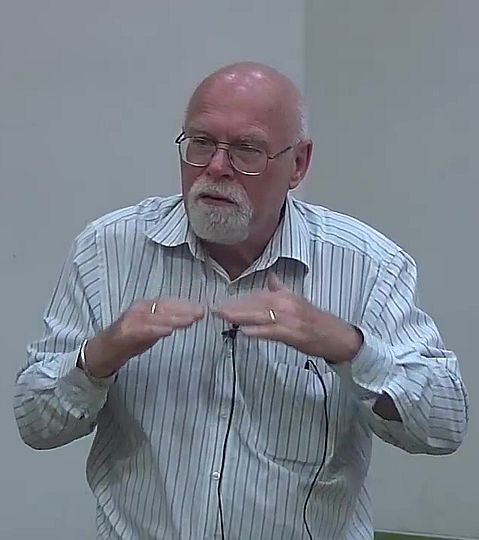
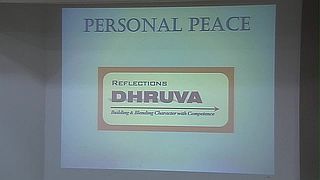 Professor Ron Geaves "Gives Satsang" about Prem Rawat
Professor Ron Geaves "Gives Satsang" about Prem Rawat
Professor Ron Geaves formerly of Liverpool Hope University is the only academic of religion who has bothered to do any "research" or write any papers dealing with Prem Rawat for the past 40 years. This is possibly because he is a fervent believer in Prem Rawat and his Knowledge and has been since 1969. To learn about his spurious propaganda masquerading as research, Click Here. Geaves was the 5th European to be initiated into the Knowledge since Prem Rawat became the incarnated Perfect Master. Geaves took the royal road to Guru Maharaj Ji's feet, a short period taking drugs and believing bullshit before bravely going where not many had gone before … India
We have a few of Ron's satsangs in which he decribes his conversion experiences, unfortunately some more have disappeared into the intervoid. Prem Rawat's organisations have a history of deleting their history as they move on. Geaves most realistic reconstruction of his conversino is that published in Dvine Times 50th Anniversary edition 1996 which he assumed wouls only ever be read by other devoted premies and would probably bring a tear to their eyes as well as his own as well as a stab of envy to their hearts. He heard the 11 year old making a speech in Hindi, as language he didn't understand, and decided that toung Rawat "was speaking very much from his heart" and hadn't memorised anything as if he was in a position to make an accurate assessment. The most imortant thing Geaves has said abour his conversion experience is :I wept tears of joy."
Geaves testified in the 2001 revisionist history Élan Vital video "Passages", clips from which are shown below (click on the photos to view the clips) which shows he is a trusted member of the elite caste of Rawat's followers.
One of the interesting things I've noticed about Rawat and his premies is that when they discuss the events of the past they update the story to be more in accord with current Rawatism doctrine which is understandable. They can hardly discuss their divine rapture when Kissing His Lotus Feet when they are trying to promote a simple method of Self-Knowledge stripped of all Hindu references. Not only do they change the story but they use the current premie language/catch words when discussing the past. Ron Geaves says the 10 year old Guru Maharaj Ji asked if he wanted a "manufactured peace" or a "real peace." I have the text of over 600 speaeches of Guru Maharaj Ji's. He never used the phrase "manufactured peace." I have the texts of nearly 300 speeches of Maharaji/Prem Rawat. The first mention of "manufactured peace" was in 2005 though it did became a staple of his speeches.
Geaves in India, 2012 giving satsang at a students' club in India
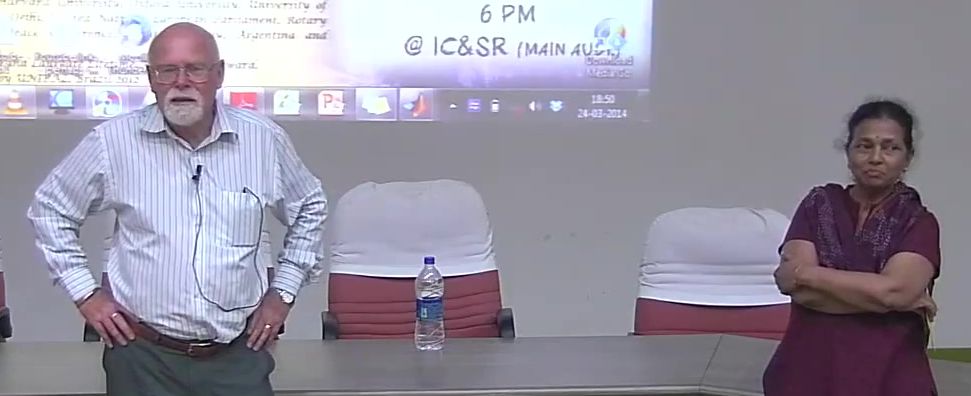
Ron has had decades of talking over uninterested, bored students so he quickly and forcefully takes charge slamming down the idea that Knowledge might make you unambitious and using his own brilliant career as an example par excellence. You have to give him respect. He's given papers at the most prestigious academic seminars at the most illustrious universities to the most respected researchers and yet he's prepared to talk at a student club in the hope that one young mind can be saved.
So sorry yeah umm I think when I look back on my life, I I first met Prem Rawat when I was traveling in India and at that point in my life I was not actually sure where I was going um I could easily have ended up writing the book that was the second book on sale out there I could have easily have gone down the road of becoming a Ind European Indian Swami, that could have been very easy. It didn't I met I met Prem Rawa. At that time you may find it very hard to believe but he's actually 10 years younger than me so umm almost exactly and to accept-at my age then I was 21 so think of his age in terms of, you know, so he was 11 so and a 21 year old doesn't easily accept the advice of an 11 year old. I have a 10 year old son back there and um I cannot think of a 21 year old who probably would accept his advice, so, and I actually saw him in his school holidays. He used to, where other children would play and do other things he used to do tours, events, across northern India at that time and I actually saw him in the first event where I saw him um there were about 10,000 people in a town called Ghaziabad near Delhi and he spoke in Hindi um at that time I had no knowledge of Hindi whatsoever. So I I sat for about one hour listening to an 11 year old boy speaking a language I didn't understand but one thing was very clear to me, that this boy sitting on a stage, was not memorising anything. He hadn't learnt it, he was speaking very much from his heart with passion with enthusiasm and at the end of that event he asked me to come and he had seen me in the audience and he asked me to come to meet him.

He was playing with a tape recorder and like I guess any other 11 year boy, you see, that he's a trained pilot, he may have caught that, he's very good at technology, very, very good, he designs software um he's always had this interest. So at that time he was playing with a tape recorder and fiddling with it and I sat and I watched him playing with the tape recorder and then he looked at me, he gave me a, and when he looked at me he asked me a very simple question, in fact he asked me three or four questions but the first one was "What is it that you want in your life?" No one had ever asked me that question before and I certainly didn't expect an 11 year old to ask it ask it to me.
The second question to me was on the nature of peace because at that time I'd come from a background of peace activism. I had been campaigning against the Vietnam war and these things back in that time in the 1960s and he asked me what kind of peace is it that you want? Do you want a peace that's manufactured or do you want a peace that already exists, has existed and always will exist. No one had ever indicated to me there were two kinds of peace, a manufactured peace and a real peace, and all the time I was thinking this is an 11 year old that's saying this to me.

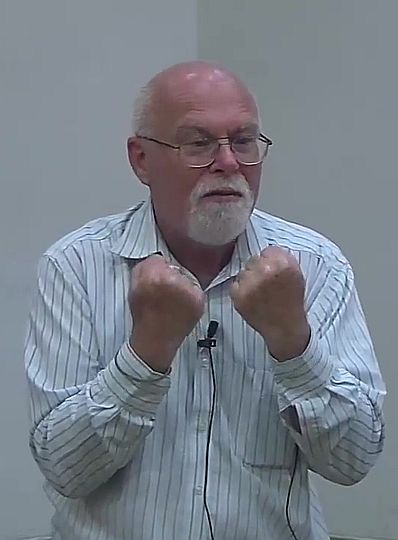
He then said to me, the third thing he said to me was "By the way this is India you're in, it's full of babas, sadhus, pirs, you know, you name it it's full of them. South India, North India, East India, West India, millions, thousands of them. You're young" he said, "I think you're about 21 so go and search search India, if you can't find that peace that's within you so come back to me." "Use me in reserve" he said, "Cause I'm even younger than you. I'll still be around." No one has ever said that to me before either. So these three things together I said to him "I think I've come already to the place where peace can be found." He said "Okay if you think that then you can stay here, no problem." From that day forwards I cannot say that my life has always been like that and nor actually would I have been content if it had been like that, because I don't like flat lining. I'm the kind of person who likes excitement, you know, so so yeah there have been ups in my life there have been downs in my life but the place which he showed me to go back to inside myself very simply, it took a very short time to show me that, was always there for me and has given me the most extraordinary, not just peace I would say, peace is not, it doesn't really say it, it's it's an aliveness, a sense of just of fulfillment but also being intensely and beautifully alive.
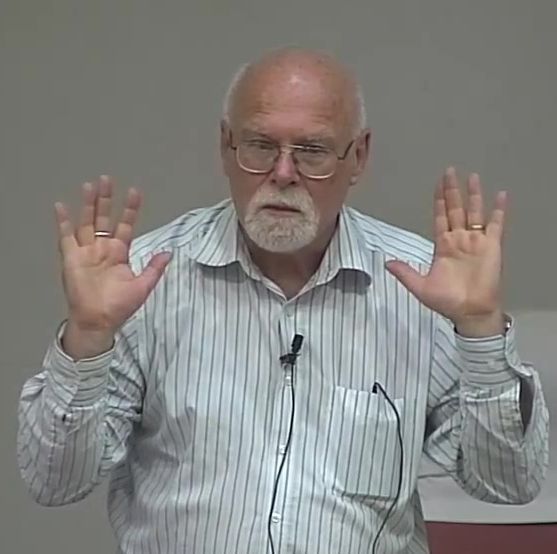
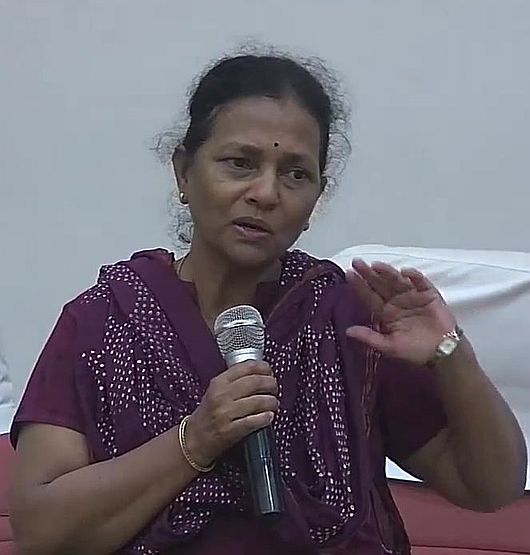
Loving life, enjoying life, appreciating life, having gratitude for life and one thing I know that I can say because one thing I always wanted even when I was young is I never wanted to be that kind of human being, that on my deathbed, I would say "I regret this, this and this and why didn't I do that that and that." I always wanted to be that kind of human bein' that on my deathbed I could say "Yeah my life has been great, it's been a wonderful gift and I've enjoyed the ride, even the ups and downs of the ride but I've loved the ride. Standin' before you, not dead or on my deathbed, very much alive, I can say that in every day of my life, even in those days where there have been difficulties and I've had to face those difficulties, I can say that my life has been the most extraordinary gift to me and I love that bein' alive, not because I've achieved this or I've achieved that or I have a beautiful son or I have a beautiful wife or I have a nice house. They're good things too but because I'm simply alive. In that life there is contentment, gratitude, joy, appreciation, wonder and we all as human beings feel those things. We all feel them what he teaches is a way to tap into it and make it more available to us and that's it. So it's not just I could find like moments, "I could say this happened or that happened, it's been a lifetime."
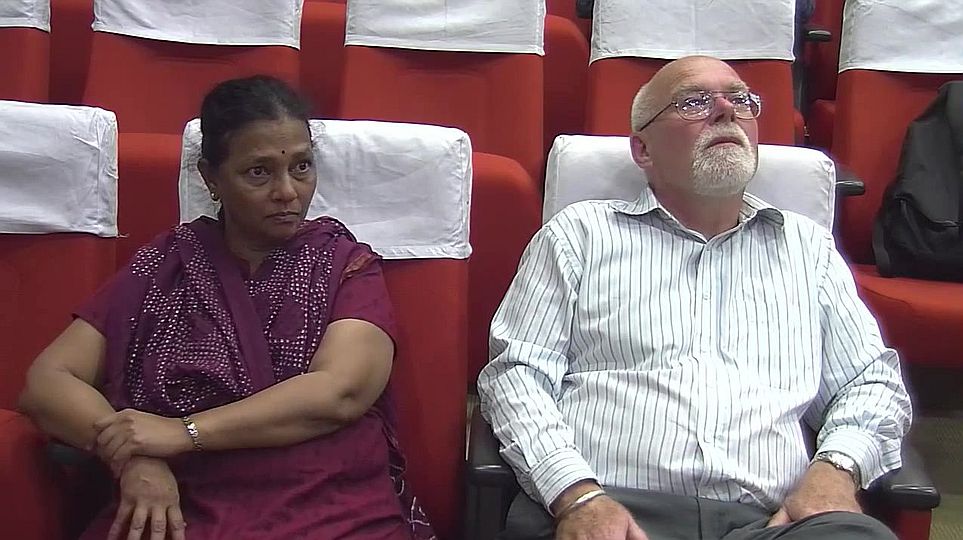
Ron Geaves as published in the Divine Times 25th Anniversary Edition, 1996
I cried the most beautiful tears
The first time that I saw Maharaji my heart knew that it had found the Master. My ideas were very different. I had hitchhiked to India with Sandy Collier very much with the hope of finding "truth". But my youthful romanticism expected to find an old bearded renunciate living in the Himalayas, probably in a cave. I would become his disciple and live there with him learning the mysteries of the inner self and eventually experience enlightenment. Almost immediately upon arrival in India we met someone who had received Knowledge and were taken to visit the ashram in Delhi. I had a dual reaction. On one hand I felt in the still atmosphere of the ashram something that I knew I searched for, but on the other hand I rejected the organization, the promotional literature and middle-class Indians trying to tell me what to do with my life. One part of me said stay. The other part said go. I left to pursue my original intention to renounce the world and find my "enlightened" monk in his cave. I got as far as Benares where I lived under a bodhi tree which doubled as a shrine to Shiva. During those few weeks many things happened which pointed me back to Maharaji.
So I returned to Delhi and travelled with the ashram premies to where Maharaji was speaking at an open-air event which was part of a tour he was doing in his summer vacation from school. I spent the day wandering among the large crowd that had gathered to hear Maharaji and I was impressed by the love and joy they manifested. In the evening I was taken to sit on the stage with the mahatmas as various speakers droned on and on in a language I could not understand. I was bored and very uncomfortable. Finally Maharaji walked on stage and began to speak. I do not know what I expected to happen, but I did not anticipate my reaction to this 11-year-old Indian boy In fact. I did not really perceive Maharaji as a child at all because all that my heart could feel was an overwhelmingly powerful recognition that this was the Master I searched for. In a second I understood all the actions of my life to that point. My heart knew that from then on everything was going to be fine because I was home. I cried the most beautiful tears of my life and prayed that I would never be cast adrift in the world alone again. I returned to England with Sandy at the end of 1969 intent on establishing an ashram as a centre to tell everyone about Maharaji and Knowledge. Maharaji had told us that he was sending Charnanand to England but I felt it would be years before Maharaji himself left India. He was still at school and so young. Eighteen months later in early June I answered the telephone on my way to work. A female Indian voice kept saying, "Maharaji is coming to London on 17 June." It wouldn't sink into my thick skull. It seemed impossible, but Maharaji was coming.
Ron Geaves Glastonbury Reminiscences, 2022
 I remember a lot of "will he, won't he", "should he, shouldn't he" as the possibility of Prem speaking at Glastonbury Fair became a real prospect. He had arrived in London in June 1971 and was only 13. Glastonbury was not on his schedule of events. There were those who spoke of drugs, sex and chaos and advised against going. Others told of prophesies and the spiritual significance of the place and time, urging him to go. He remained free from all the speculation. His only concern was would people listen to him.
I remember a lot of "will he, won't he", "should he, shouldn't he" as the possibility of Prem speaking at Glastonbury Fair became a real prospect. He had arrived in London in June 1971 and was only 13. Glastonbury was not on his schedule of events. There were those who spoke of drugs, sex and chaos and advised against going. Others told of prophesies and the spiritual significance of the place and time, urging him to go. He remained free from all the speculation. His only concern was would people listen to him.
In the meantime, the pleading phone calls from Glastonbury increased. On the morning of June 21, he asked me if a car was available that day. "Yes", I said. "Carol's Cortina is here." In the afternoon, he was ready to go. "Where to?" I asked. "Glastonbury," he replied.
I remember rain, skidding and people pushing the car up the hill to the Pyramid Stage. It was all chaotic. Then he was on the stage speaking to the crowd. I stood next to him and looked over the expectant hushed audience. He kept it short and concise. On the way back, we stopped for a tea. He said, "Be ready, hundreds will come after this event." And they did. In my memories, Glastonbury Fayre, June 21, 1971 will always be a significant milestone in a lifetime Prem Rawat has committed to peace."
Ron Geaves: 'Passages' video 2000
"Because he asked me what I wanted and I said I wanted peace. Uh and it's very interestin' because his approach to that was the opposite to what I thought it would be. Ah you'd
expect, you know, if he was this kind of person who's out to get followers, you know, he'd say "Right come to me, I, I can give it to you but actually he said the opposite, he said "I'm really young, you're not so old yourself. Go and search the whole of India," he said "There are millions of people here who promise peace", you know, he said "Check everything out" he said "and if you can't find it anywhere else" he said "hold me in reserve" (giigles) you know and ah, you know, "I'll be around" And I thought about that for not for very long just a few seconds and I thought "Well it seems a bit of a waste really Maharaji to go chasing all over India which might take me years when I think actually you've got the answer to it here here and now so can I please stay around and he said "Sure, if you want to, you can." - Ron Geaves
"He's certainly fullfilled his promise and sort of going back to that original moment when when I sat in front of him and and asked him for peace if I could find peace in my life and, and that has certainly been
fulfilled perhaps not in the way I expected you see I had this sort of hippie concept, sort of a bit of politics and anti-Vietnam (giggles) and feeling a bit cool inside myself but, but a real deep fulfillment inside my life, umm, there are things I can say about my life which I would like to hope that all human beings can say, I think all human beings should be able to say it but I can actually honestly say it those things I can, I can look at my life and say "My life has been absolutely fantastic." The, umm, I cannot think of any way that it could of been better. It's just, you know, that's not to say there haven't been problems or difficulties but it but the fulfillment that Knowledge has given me and the inspiration that Maharaji has given me has meant that I am actually able to look at my existence, my life and say this is the most extraordinary thing that ever happened to me and if I died right now I would say I would die saying 'WOW'!"
"And I don't have any theories about afterlife or next life or reincarnation but if there is reincarnation I would like to come back and have another go at it really and do exactly the same thing (giggles) you know it's just and I think to be able to say that as a as a human being that your life has been fantastic, incredible you know it would be hard for anyone to have a better life than you is a compliment to Maharaji and Knowledge." - Ron Geaves
"And I don't have any theories about afterlife or next life or reincarnation but if there is reincarnation I would like to come back and have another go at it really and do exactly the same thing (giggles) you know it's just and I think to be able to say that as a as a human being that your life has been fantastic, incredible you know it would be hard for anyone to have a better life than you is a compliment to Maharaji and Knowledge." - Ron Geaves
"I can, I can look at my life and say "My life has been absolutely fantastic." The, umm. I cannot think of any way that it could of been better. It's just, you know, that's not to say there haven't been problems or difficulties."
"And I don't have any theories about afterlife or next life or reincarnation but if there is reincarnation I would like to come back and have another go at it really and do exactly the same thing (giggles) you know it's just and I think to be able to say that as a as a human being that your life has been fantastic, incredible you know it would be hard for anyone to have a better life than you is a compliment to Maharaji and Knowledge." - Ron Geaves
Geaves introduces Rawat in a rented room at Oxford University in 2006
Geaves was not a Professor at Oxford or Cambridge, nor any major university.
There is a seamless join between my academic pursuit of knowledge and my personal journey towards fulfilment. The boundaries have always been permeable and that owes much to Prem Rawat. His inspiration throughout most of my adult life, particularly upon my own innate capacity to question. There's a kind of symmetry for me to be able to introduce Prem Rawat and welcome him to Oxford. I lived in this city nearly 40 years ago and it was here that I first met two undergraduates who had an interest in Sufism and they inspired me to look beyond the parameters of my upbringing and go further afield in my journey for fulfilment. More importantly, it was in Oxford that I germinated a seed of desire to travel eastwards to India, leaving from this city in 1968 on an overland journey that was still possible in those days.
It was in India in the summer of 1969 that I first met Prem Rawat or Maharaji as he is affectionately known in India and by many around the world At the time Prem Rawat was only 11 years old. He could combine the normal life of a young schoolboy at St Joseph's Academy, Dehraldun with something much more unusual in one so young. He had picked up the challenge to continue the teachings of his father, Shri Hans Ji Maharaj, who had tragically passed away in 1966 when his youngest son Prem Rawat was only eight. Every school holiday where his classmates would be engaged in the more conventional pursuits of childhood, Prem Rawat would tour northern India addressing the public. It was at one such gathering in Ghaziabad just outside Delhi that I first heard him speak. There was a crowd of around 10,000 people, some certainly attracted by the novelty of an 11 year old speaker. I could not understand what he was saying. My Hindi was virtually non existent but I could certainly judge that whatever he had said, he had spoken with passion and authority, and clearly from the heart rather than reading from a prepared script like I am.
I was impressed by that and resolved to know more during that summer I came to listen to him speak on a number of occasions and accepted his hospitality to pass some time at his family home in Dehradun. By then I knew a little more about his message and why that passion to communicate it fired someone so young. He had begun to inspire me with his enthusiasm for peace and inner fulfilment, and it was in Dehradun in 1969 that I first spoke to him about coming to the West. The rest is history. He arrived in London on June the 17th, 1971 at the age of thirteen, spoke at several venues, including the first Glastonbury Festival and also travelled to France, Germany and the United States. Thus began a journey that would take him around the world countless times up to the present day, speaking to audiences that range in size from hundreds to hundreds of thousands.
I have observed him closely over the years. There have been changes. Of course there have been. His 4 children are now considerably older than Prem Rawat was when I first met him. But one thing remains the same and it still impresses me. The heartfelt passion to communicate remains undiminished. Over the years. I've come to admire his passion for existence and I remain infused by the content of his message. In my own personal growth as a human being that has been significant, sometimes a source of strength when required, sometimes a force for stability when everything else shifted and I must confess, even in my career, it has helped to develop a world view that underpins my thinking and writing. It is a special moment for me to welcome him to this city, where for me so many years ago, a journey first began that has such an has had such an significant impact on the person I am now. I would like to offer my thanks to him for giving his time and energy to speak to us this evening. Would you please join me in given a very warm welcome to Prem Rawat.